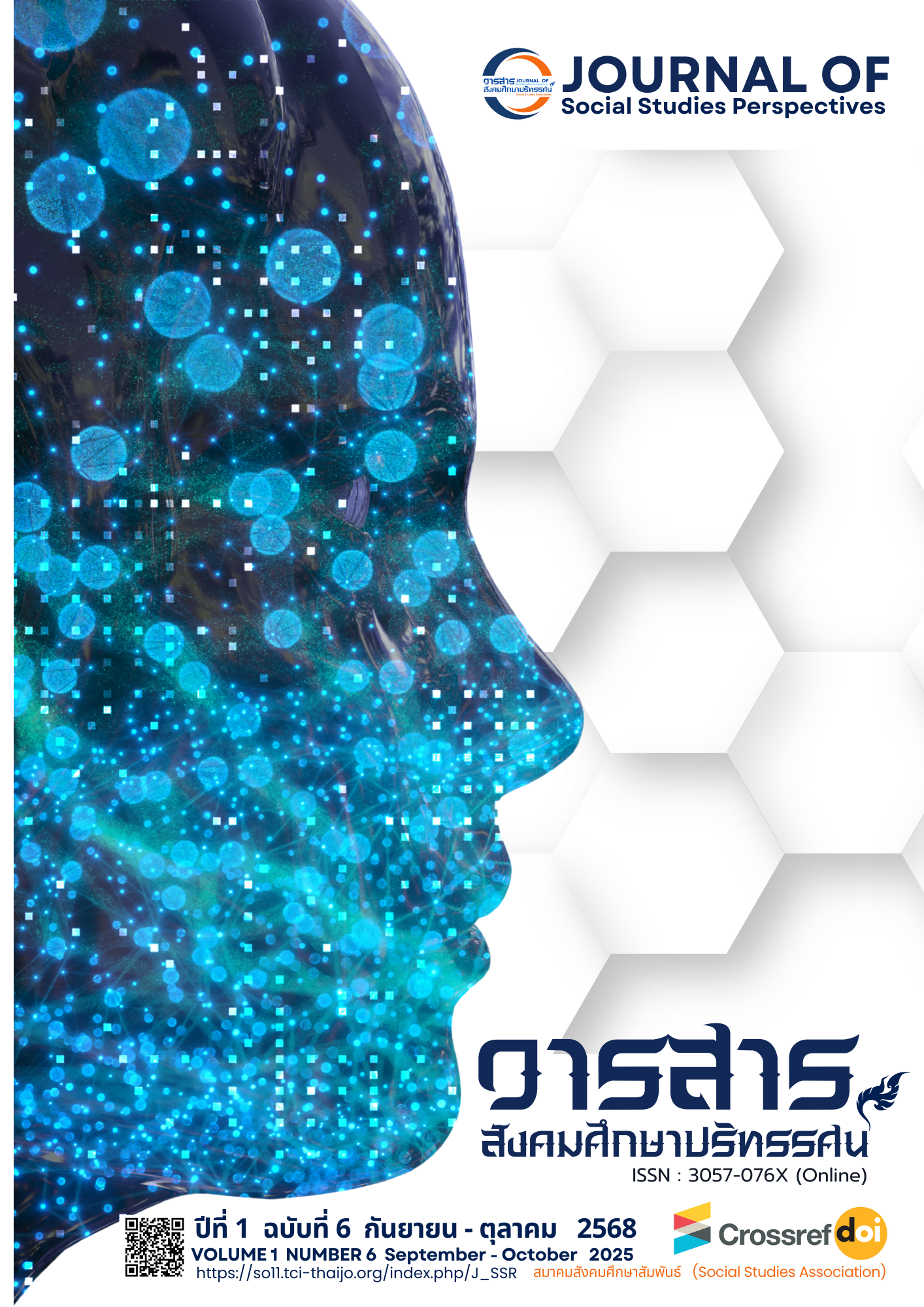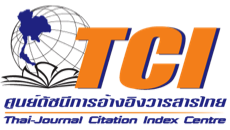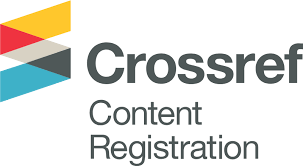การจัดการเรียนรู้วิทยาศาสตร์โลกโดยใช้กระบวนการสร้างแบบจำลอง
DOI:
https://doi.org/10.64186/jsp2495คำสำคัญ:
แบบจำลอง, กระบวนการสร้างแบบจำลอง , การจัดการเรียนรู้วิทยาศาสตร์โลกบทคัดย่อ
บทความวิชาการนี้มุ่งศึกษาการจัดการเรียนรู้วิทยาศาสตร์โลกโดยใช้กระบวนการสร้างแบบจำลอง ทั้งนี้การสร้างแบบจำลองมีประโยชน์ต่อการจัดการเรียนรู้วิทยาศาสตร์โลกคือ การช่วยให้นักเรียนเกิดความรู้และความเข้าใจด้านเนื้อหาวิทยาศาสตร์โลก ทักษะกระบวนการทางวิทยาศาสตร์ ทักษะการคิดเชิงวิทยาศาสตร์ และการค้นหาข้อมูลและการตวจสอบคุณภาพของแหล่งข้อมูลสำหรับการค้นหาข้อมูล ตลอดจนช่วยให้นักเรียนปลอดภัยจากปรากฏการณ์ทางธรรมชาติที่อันตรายได้ นอกจากนี้พบปัญหาของแบบจำลองและการสร้างแบบจำลองในการจัดการเรียนรู้วิทยาศาสตร์โลก คือ นักเรียนและครูผู้สอนวิทยาศาสตร์โลกมักความเข้าใจที่คลาดเคลื่อนของแบบจำลอง และการขาดทักษะและความรู้ที่เพียงพอต่อการสร้างแบบจำลอง โดยปัญหาเกี่ยวกับความเข้าใจที่คลาดเคลื่อนของแบบจำลองนั้นควรส่งเสริมให้ครูผู้สอนวิทยาศาสตร์โลกสามารถจัดการเรียนรู้วิทยาศาสตร์โลกโดยใช้แบบจำลองทางกายในลักษณะแบบจำลองเชิงเปรียบเทียบ และใช้ตัวแทนความคิดที่ใช้ข้อมูลสารสนเทศเป็นฐานในการแสดงให้เห็นภาพเพื่อให้นักเรียนเข้าใจหัวข้อวิทยาศาสตร์โลกมากยิ่งขึ้น นอกจากนี้ปัญหาการขาดทักษะและความรู้ที่เพียงพอต่อการสร้างแบบจำลองนั้นควรให้ครูและนักเรียนเข้าใจแนวคิดการสร้างแบบจำลองและสามารถสร้างแบบจำลองได้โดยใช้กระบวนการสร้างแบบจำลองในการจัดการเรียนรู้วิทยาศาสตร์โลกประกอบด้วย 4 ขั้นตอน ได้แก่ 1) การสร้างแบบจำลอง 2) การใช้แบบจำลอง 3) การทดสอบและประเมินแบบจำลอง และ 4) การแก้ไขและปรับปรุงแบบจำลอง สิ่งเหล่านี้ช่วยแก้ปัญหาของการสร้างแบบจำลองในการจัดการเรียนรู้วิทยาศาสตร์โลกได้อย่างมีประสิทธิผล
เอกสารอ้างอิง
Böschl, F., Forbes, C., & Lange-Schubert, K. (2022). Investigating scientific modeling practices in U.S. and German elementary science classrooms: A comparative, cross-national video study. Science Education, 107(2), 368–400. https://doi.org/10.1002/sce.21780
Bryce, C. M., Baliga, V. B., De Nesnera, K. L., Fiack, D., Goetz, K., Wade, C. L., Yovovich, V., Baumgart, S., Bard, D. G., Ash, D., Parker, I. M., & Gilbert, G. S. (2016). Exploring models in the biology classroom. The American Biology Teacher, 78(1), 35–42. https://doi.org/10.1525/abt.2016.78.1.35
Charoen, W., & Sangsuwan, A. (2023). Development of scientific modeling on factors affecting rate of a chemical reaction using inquiry-based learning combined with created animations. Journal of Science, Technology, and Energy Lampang Rajabhat University, 14(1), 26–42.
Cheng, M. F., Lin, J. L., Lin, S. Y., & Cheng, C. H. (2017). Scaffolding middle school and high school students’ modeling processes. Journal of Baltic Science Education, 16(2), 207–217. https://doi.org/10.33225/jbse/17.16.207
Clement, J. (2008). The role of explanatory models in teaching for conceptual change. In S. Vosniadou (Ed.), International handbook of research on conceptual change (pp. 417–452). Routledge.
Deus, H. M., Bolacha, E., Vasconcelos, C., & Fonseca, P. E. (2011). Analogue modelling to understand geological phenomena. In Proceedings of the GeoSciEd VI. University of Witwatersrand.
Edwards, A. (2017). The effectiveness of model-based instruction on student achievement and student metacognition in advanced chemistry classes [Doctoral dissertation, Kennesaw State University]. Kennesaw State University Digital Commons. https://digitalcommons.kennesaw.edu/seceddoc_etd/11
Espinet, M., Izquierdo, M., Bonil, J., & Ramos-de Robles, S. L. (2012). The role of language in modeling the natural world: Perspectives in science education. In B. J. Fraser et al. (Eds.), Second international handbook of science education (pp. 1385–1403). Springer. https://doi.org/10.1007/978-1-4020-9041-7_89
Gilbert, J. K. (2004). Models and modelling: Routes to more authentic science education. International Journal of Science and Mathematics Education, 2(1), 115–130.
Gilbert, J. K., & Justi, R. (2016). Modelling-based teaching and learning: Current challenges and novel perspectives. In J. K. Gilbert & R. Justi (Eds.), Modelling-based teaching in science education (pp. 253–262). Springer.
Gobert, J. D., & Buckley, B. C. (2000). Introduction to model-based teaching and learning in science education. International Journal of Science Education, 22(9), 891–894.
Göhner, M. F., Bielik, T., & Krell, M. (2022). Investigating the dimensions of modeling competence among preservice science teachers: Meta-modeling knowledge, modeling practice, and modeling product. Journal of Research in Science Teaching, 59(8), 1354–1387. https://doi.org/10.1002/tea.21613
Halloun, I. (1998). Schematic concepts for schematic models of the real world: The Newtonian concept of force. Science Education, 82(2), 239–263.
Halloun, I. A. (2011). From modeling schemata to the profiling schema: Modeling across the curricula for profile shaping education. In J. Gilbert, M. Bulte, & L. S. Van Driel (Eds.), Models and modeling: Cognitive tools for scientific enquiry (pp. 77–96). Springer.
Hallström, J., Norström, P., & Schönborn, K. J. (2023). Authentic STEM education through modelling: An international Delphi study. International Journal of STEM Education, 10, 62. https://doi.org/10.1186/s40594-023-00433-6
Harrison, A. G., & Treagust, D. F. (1998). Modelling in science lessons: Are there better ways to learn with models? School Science and Mathematics, 98(8), 420–429.
Harrison, A. G., & Treagust, D. F. (2000). A typology of school science models. International Journal of Science Education, 22(9), 1011–1026.
Hestenes, D. (1997). Modeling methodology for physics teachers. In AIP Conference Proceedings (pp. 935–958). American Institute of Physics.
Ifqiren, S., Bouzit, S., Kouchou, I., & Selmaoui, S. (2023). Modelling in the scientific approach to teaching life and earth sciences: Views and practices of Moroccan teachers. Journal of Education and e-Learning Research, 10(4), 605–615.
Intho, W. (2016). Model based learning in earth science, astronomy, and space science. https://earthscience.ipst.ac.th/wp-content/uploads/sites/19/2016/09/การจัดการเรียนรู้โดยใช้แบบจำลองเป็นฐาน.pdf
Justi, R. (2009). Learning how to model in science classroom: Key teacher's role in supporting the development of students’ modelling skills. Educación Química, 20(1), 32–40.
Justi, R., & Gilbert, J. K. (2002). Modelling, teachers’ views on the nature of modelling, implications for the education of modellers. International Journal of Science Education, 24(4), 369–387.
Lisle, R. J. (2006). Google Earth: A new geological resource. Geology Today, 22(1), 29–32.
Parmboon, W., Sittisomboon, M., & Onthanee, A. (2023). Development of learning activities by using model-based learning on the topic of immune system to enhance systems thinking ability for eleventh grade students. Mahachula Academic Journal, 10(7), 64–77.
Pathomchaiwal, S. (2020). A study of upper secondary earth science teachers’ pedagogical content knowledge in Bangkok metropolitan [Master’s thesis, Chulalongkorn University]. Chulalongkorn University Intellectual Repository. http://cuir.car.chula.ac.th/handle/123456789/76710
Praisri, A., Faikhamta, C., Tanak, A., Pongsophon, P., & Jantarakantee, E. (2022). Modeling practice and use in science classroom. Journal of Education Naresuan University, 24(1), 349–358.
Praisri, A., Panich, C., & Faikhamta, C. (2023). Model-based learning in physics. IPST Magazine, 51(244), 26–32.
Schwarz, C. V., Reiser, B. J., Davis, E. A., Kenyon, L., Achér, A., Fortus, D., Shwartz, Y., Hug, B., & Krajcik, J. (2009). Developing a learning progression for scientific modeling: Making scientific modeling accessible and meaningful for learners. Journal of Research in Science Teaching, 46(6), 632–654.
Sell, K. S., Herbert, B. E., Stuessy, C. L., & Schielack, J. (2006). Supporting student conceptual model development of complex Earth systems through the use of multiple representations and inquiry. Journal of Geoscience Education, 54(3), 396–407.
Valanides, N., & Angeli, C. (2011). Teaching pre-service elementary teachers to teach science with computer models. In J. Gilbert, M. Bulte, & L. S. Van Driel (Eds.), Models and modeling: Cognitive tools for scientific enquiry (pp. 263–279). Springer.
Williams, G., & Clement, J. (2015). Identifying multiple levels of discussion-based teaching strategies for constructing scientific models. International Journal of Science Education, 37(1), 82–107.
ดาวน์โหลด
เผยแพร่แล้ว
รูปแบบการอ้างอิง
ฉบับ
ประเภทบทความ
หมวดหมู่
สัญญาอนุญาต
ลิขสิทธิ์ (c) 2025 วารสารสังคมศึกษาปริทรรศน์

อนุญาตภายใต้เงื่อนไข Creative Commons Attribution-NonCommercial-NoDerivatives 4.0 International License.
บทความนี้ได้รับการเผยแพร่ภายใต้สัญญาอนุญาต Creative Commons Attribution-NonCommercial-NoDerivatives 4.0 International (CC BY-NC-ND 4.0) ซึ่งอนุญาตให้ผู้อื่นสามารถแชร์บทความได้โดยให้เครดิตผู้เขียนและห้ามนำไปใช้เพื่อการค้าหรือดัดแปลง หากต้องการใช้งานซ้ำในลักษณะอื่น ๆ หรือการเผยแพร่ซ้ำ จำเป็นต้องได้รับอนุญาตจากวารสาร










